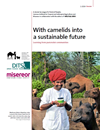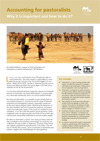With camelids into a sustainable future
Pastoral camelid husbandry is rapidly changing worldwide. Whether in the drylands of Asia and Africa (the “Old World”) or in the Andean highlands (the “New World”), camel herders face increasing challenges.

This dossier by the League for Pastoral Peoples, the German Institute for Tropical and Subtropical Agriculture and Misereor offers a differentiated picture of camelid pastoralists’ realities. An introduction to the importance of pastoralism worldwide is followed by an analysis of how camelid husbandry has evolved over recent decades. In the second part, you can learn about pastoral camelid keepers in the Andean highlands, Eastern Africa and Mongolia. The third part of the dossier looks at the role of research on camelid pastoralism and discusses camelid policies that are needed for a resilient future.
The dossier is available in English and German.
Accounting for pastoralists: Why it is important and how to do it?
Ilse Köhler-Rollefson / League for Pastoral Peoples and Endogenous Livestock Development / 2020

Pastoralism is a way of raising animals with nature. It entails the movement of people and herds across landscapes, making use of natural vegetation and crop by-products.
Pastoralism corresponds to public demands for high animal welfare and environmentally friendly methods of livestock production. If we want to make the livestock sector more sustainable, this production system requires strong policy support.
We currently do not know how many pastoralists there are globally or within each country. This is due to the absence of data collection and because pastoralism is not a distinct category in livestock censuses.
Outdated colonial concepts and one-sided focus on the “efficiency” of livestock systems have prevented the recognition of the benefits of pastoralism as a solar-powered, biodiversity-conserving food-production strategy.
In order to monitor the situation and provide a basis for policymaking, FAO should lead a global initiative to define pastoralism and record data by production system.
